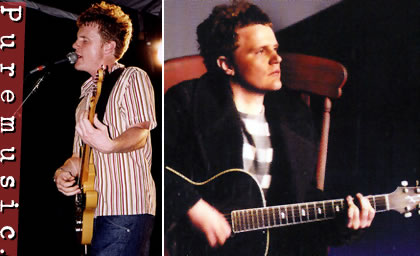
A Conversation with David Mead (continued)
PM: And you have two of my favorite musicians and people on the record, both Marc Pisapia playing drums throughout, and I don't know how much lap steel Joe played, but those are just two of the greatest musicians and guys that I think we both know.
DM: I would agree.
PM: I thought Marc was an inspired choice for a drummer, because when you play things so intimate, I mean, his dynamic range, it's unparalleled. He can get just as quiet as you want, and as loud as you want. And he's all about the song.
DM: Yeah, absolutely. He has little nuances that he does, which I think kind of--I mean, it's not like he has signature licks, exactly, he just sort of has a way he--how do you say it? I mean, it's sort of stiff in a really good way. It's almost orchestral in a sense, the way he approaches it. Do you know what I mean?
PM: Yeah. And as you're speaking I can picture him sitting there doing that kind of orchestral thing.
DM: He definitely has his own groove. And I also thought that since he's done a few records now with Brad--Brad's a big fan of the way that he and Hags play together, his kind of approaching it from a scientific angle before, apparently. So it was fun watching Brad lock in with Marc, and see the two of them get their own particular boogie on.
PM: Wow. And so to give me a picture of the recording situation, how does it go on at David Henry's? Is it iso rooms [isolated booths, to keep the microphones from "bleeding" into one another, so that each track is independently mixable later] or is everybody in one room with baffles, or what's it look like?
DM: Well, the studio is basically a converted house. And I think he has the capability to do it however you choose within reason. But another decision that we made from the outset of the record was that we really wanted the pulse to be driven by me, and the way I play solo. Because generally I've gotten together with a band or musicians and done the standard pre-production rehearsal routine. And then we go in and start cutting from the basic tracks up. That's what we had done on, for instance, the record that hasn't been released. And I wanted to try relying a little bit more on my own musicianship to propel it, I suppose.
So that's the way we started. We recorded just live takes of me doing the song on guitar or piano, and then we'd go on from there. So everyone was recorded separately, to the best of my recollection.
PM: Oh, you mean you'd cut them on guitar or piano, and you'd have a vocal, and you'd have both of those tracks done and then you'd do drums by themselves and bass by itself, and each element would be added a track at a time.
DM: That's correct.
PM: That's the way I might like to do my next record, so that's very cool to hear you did it and it worked out well.
DM: Yeah, I think so. It got away from us, too. I feel like most of the production aspects of this record were more about editing than they were about desperately trying to come up with ideas, because there wasn't really a shortage of those between all of the people who were playing on it.
PM: Not with that crowd.
DM: Yeah, right. It was more about making sure that the element of the singer and the main instrument stayed in front of it without being obnoxious, you know what I mean? Because they were live takes, so there's definitely, like, warts and mistakes all over my part.
PM: Thank God.
DM: Yeah, definitely. And actually both David and Brad were very good about making me leave a lot of that stuff alone, because my tendency would probably be to try to correct it more.
PM: But they always become our favorite parts of the records, right?
DM: Yeah, they often do. And Brad and David were very good about reminding me of that. So I like that balance. It has a little bit of stink on it, it seems like, but I think at the end of the day if it's a good song and it's got some soul in it, then it's going to work. It doesn't really matter if there's some clunkers along the way.
PM: And the other benefit of doing it the way you did it, starting with the artist and his principal instrument on the tune, is that now that song is much more credible when you perform it solo.
DM: Yes. That's very true. And I knew the reality of touring for this record, whether I put it out by myself or on another label, was probably going to be, at least initially, having to tour either solo or pretty pared down. I didn't think I was going to be able to take four guys on the road with me. And that was important, because although I've never really felt responsible for the fact that I couldn't tour with a band a lot, I have wished my audience could have seen many of my previous records in that formation a little bit more, because they are a lot more about a band performance. But this one doesn't bear that burden, I don't think. continue
print (pdf) listen to clips puremusic home